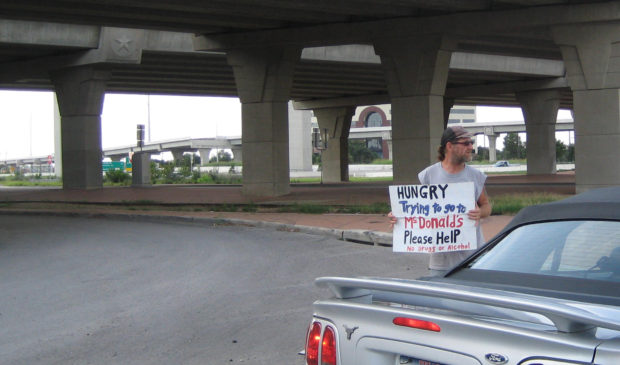City, county look to private investors to help on homelessness
Monday, August 12, 2019 by
Jack Craver Travis County commissioners are cautiously optimistic about the county’s participation in a multi-jurisdictional program aimed at helping some of the county’s most destitute residents.
The program, Pay for Success, is a collaboration between the county, the city and a number of area nonprofits and health care providers.
Under the model, Social Finance, a nonprofit that specializes in Pay for Success programs, recruits private investors to provide upfront capital to operate the program. The public sector entities – the city and county – will reimburse the investors based on the results of the program. If the program performs poorly, the investors may not earn any reimbursement. If it performs very well, the investors will get back enough money to turn a profit.
The estimated cost of the project is $16.3 million for five years. The county’s maximum contribution will be $3 million, while the city’s will be $6 million. Central Health, Community Care Collaborative, Episcopal Health Foundation, Ascension-Seton, St. David’s Foundation and Seton Health Care will also provide funding.
The payer agreements have not yet been finalized. A county spokesperson said they will likely be signed in the fall, after which the program can begin.
The program’s objective is to get 250 homeless people who are costing local government and area health care providers significantly due to frequent arrests and/or hospital visits. By providing these individuals with housing and access to treatment, the organizations participating in the program are betting they can reduce their overall cost to the system.
The program’s performance will be judged on three key measures:
- The number of consecutive 30-day periods a program participant maintains a lease in permanent supportive housing
- The percent change in jail bed days and bookings for each cohort of program participants
- The percent change in emergency department visits and inpatient hospital days
For instance, the program will pay investors $2,025 per month for the first 12 months a participant remains in permanent supportive housing. If the person remains in housing for more than a year, the monthly payment goes up to $2,500.
Participants are allowed to be absent from their unit for up to 90 days before they are kicked out of the program.
The goal is “cost avoidance,” rather than “cost savings,” explained Roger Jefferies, county executive for justice planning, at a Tuesday meeting of the Commissioners Court.
Based on an analysis of 250 people likely to be targeted by the program, the Ending Community Homelessness Coalition estimates that participants average three jail bookings a year and spend an average of 24 nights in jail per booking.
A 2012 study by the county estimated that it spends $35.38 a day for inmates with mental health problems. That is on top of $78 of fixed costs per jail booking. Jefferies said it was unlikely that the program would reduce jail population enough to impact the fixed costs, which are largely tied to staffing and the cost of running the facility.
County staff estimates the program could help the county avoid $2.55 million in jail costs.
The program will be rolled out gradually, beginning with 75 participants in the first year and ramping up to 250 by the fourth. If people drop out of the program, they could be replaced by new participants.
Matt Mollica, the new executive director of ECHO, which will be in charge of finding housing for the participants, oversaw a similar initiative in Denver, where until recently he served as head of the Colorado Coalition for the Homeless.
In Denver, he said, many of the program participants were housed in one 100-unit building, which was also the site of a number of associated services. Austin’s plan is for participants to be dispersed in different locations. However, participants will still receive regular visits – two to three per week – from case workers and medical professionals.
Commissioner Brigid Shea wanted more information about how the program will ensure that residents who are housed are not engaging in any undesirable behavior. She has received complaints about people housed by Integral Care, the local mental health agency.
“Neighbors who are very accepting, and are willing to have this housing in their neighborhoods, are experiencing regular problems with people standing in the middle of the street, stopping traffic, shaking down kids on their way to school for lunch money, knocking on neighbors’ doors in the middle of the night … leaving trash all over the place,” Shea explained.
Commissioner Jeff Travillion emphasized the importance of communicating with neighborhood associations about the program and its participants.
“We don’t know whether this will work,” County Judge Sarah Eckhardt acknowledged. “That’s why it’s a pilot. That’s why this money is going to be in escrow, to see if this works.”
She added that it’s not the role of the commissioners to get “prescriptive” in how the program is run. The service providers will operate the program and if it achieves a reduction in jail bookings and hospital stays, it’s a success from the county’s perspective.
Photo by Clay Junell made available through a Creative Commons license.
The Austin Monitor’s work is made possible by donations from the community. Though our reporting covers donors from time to time, we are careful to keep business and editorial efforts separate while maintaining transparency. A complete list of donors is available here, and our code of ethics is explained here.
You're a community leader
And we’re honored you look to us for serious, in-depth news. You know a strong community needs local and dedicated watchdog reporting. We’re here for you and that won’t change. Now will you take the powerful next step and support our nonprofit news organization?




